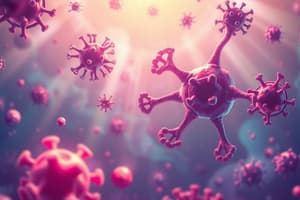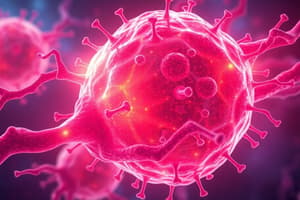Podcast
Questions and Answers
What does RNA polymerase synthesize using a DNA template?
What does RNA polymerase synthesize using a DNA template?
- Single stranded RNA (correct)
- Double stranded DNA
- Single stranded DNA
- Double stranded RNA
Which sequences in DNA are essential for RNA polymerase to know where to start and stop transcription?
Which sequences in DNA are essential for RNA polymerase to know where to start and stop transcription?
- Promoter and terminator sequences (correct)
- Repressor and enhancer sequences
- Start codons and stop codons
- Introns and exons
Which statement is true regarding the transcription of the promoter sequence?
Which statement is true regarding the transcription of the promoter sequence?
- It is transcribed last.
- It is transcribed first. (correct)
- It is transcribed in segments.
- It is never transcribed.
What key feature distinguishes E.coli RNA polymerase from E.coli DNA polymerase?
What key feature distinguishes E.coli RNA polymerase from E.coli DNA polymerase?
How many general transcription factors are minimally required for transcription by RNA pol-II?
How many general transcription factors are minimally required for transcription by RNA pol-II?
What do eukaryotic promoters contain that allows for the recruitment of RNA polymerase?
What do eukaryotic promoters contain that allows for the recruitment of RNA polymerase?
What distinguishes eukaryotic RNA polymerases from each other?
What distinguishes eukaryotic RNA polymerases from each other?
What is primarily required for RNA pol-II to initiate transcription?
What is primarily required for RNA pol-II to initiate transcription?
What is the role of the kinase subunit in TFIIH?
What is the role of the kinase subunit in TFIIH?
Which complex is essential for linking general transcription factors to gene-specific transcription factors?
Which complex is essential for linking general transcription factors to gene-specific transcription factors?
If a yeast cell cannot produce TFIIF, which of the following would not occur?
If a yeast cell cannot produce TFIIF, which of the following would not occur?
What type of protein does the BCL11A gene encode?
What type of protein does the BCL11A gene encode?
What is the primary function of enhancers in gene expression?
What is the primary function of enhancers in gene expression?
When BCL11A function is removed from an adult mouse, which type of hemoglobin is produced?
When BCL11A function is removed from an adult mouse, which type of hemoglobin is produced?
What allows distant regulatory elements to interact effectively during transcription regulation?
What allows distant regulatory elements to interact effectively during transcription regulation?
What aspect is characteristic of gene-specific transcription factors?
What aspect is characteristic of gene-specific transcription factors?
What is the primary function of the promoter sequence in transcription?
What is the primary function of the promoter sequence in transcription?
Which stage of transcription follows the initiation phase?
Which stage of transcription follows the initiation phase?
How does bacterial RNA polymerase initiate transcription compared to eukaryotic RNA polymerase?
How does bacterial RNA polymerase initiate transcription compared to eukaryotic RNA polymerase?
What role do enhancer sequences play in transcription?
What role do enhancer sequences play in transcription?
What do the terms 'template strand' and 'coding strand' refer to in the context of transcription?
What do the terms 'template strand' and 'coding strand' refer to in the context of transcription?
Which of the following correctly describes the difference between eukaryotic and prokaryotic transcription?
Which of the following correctly describes the difference between eukaryotic and prokaryotic transcription?
What is the direction of mRNA synthesis during transcription?
What is the direction of mRNA synthesis during transcription?
What is the significance of transcriptional termination?
What is the significance of transcriptional termination?
Flashcards are hidden until you start studying
Study Notes
Transcription Learning Objectives
- Compare and contrast DNA replication and transcription
- Explain how E. coli RNA polymerase initiates transcription
- Diagram a bacterial promoter sequence
- Describe the processes of transcriptional elongation and termination
- Summarize the roles of different eukaryotic RNA polymerases
- Distinguish between the binding of bacterial and eukaryotic RNA polymerases to promoters
- Describe the functions of the general transcription factors for RNA polymerase II
- Compare and contrast promoters and enhancers
- Describe how activators and repressors affect transcription
Transcription Key Concepts
- Transcription begins at a promoter sequence
- Transcription ends at a terminator sequence
- Transcription occurs in three stages: initiation, elongation, and termination
- Prokaryotic initiation involves a sigma factor and RNApol holoenzyme
- Eukaryotic initiation involves general transcription factors, RNApol II, and a mediator complex
- Additional gene-specific transcription factors that bind to enhancer sequences may be required
- Gene-specific transcription factors may activate or repress gene transcription
Replication vs. Transcription
- DNA Replication makes a complete copy of the chromosome
- During transcription, only portions of DNA sequence are transcribed into RNA
- Both DNA and RNA are synthesized in the 5’ to 3’ direction
Coding Strand vs. Template Strand
- Transcription produces RNA that is complementary to one strand of DNA
- The template strand is different for different genes
RNA polymerase carries out transcription
- RNA Polymerase synthesizes single-stranded RNA using DNA as a template
- New RNA strand is synthesized in the 5’ to 3’ direction
E. coli RNA polymerase
- Has a core enzyme (two alpha subunits, one beta subunit, one beta prime subunit)
- Has a sigma subunit
Sequences in DNA tell RNA pol where to start and stop transcription
– Promoter: sequence of DNA that signals the start of a gene – Terminator: sequence of DNA that signals the end of a gene
E. coli promoters contain -10 and -35 consensus sequences
- The -10 sequence is called the Pribnow box
- The -35 sequence is the -35 box
Bacterial transcription stops at the terminator sequence
- Termination occurs when RNA polymerase encounters a terminator sequence
- Terminator sequences are often rich in GC content
- Termination can be rho-dependent or rho-independent
Eukaryotic RNA Polymerases
- Recognize different promoters
- Transcribe different classes of genes
- All consist of 12-17 different subunits, 9 conserved subunits, 5 are related to bacterial subunits
_____________________ are required for eukaryotic RNA pol
- General transcription factors (GTFs)
- Additional gene-specific transcription factors
5 general transcription factors are minimally required for transcription by RNA pol-II
- TFIID (large protein complex): binds to the TATA box
- TFIIB: recruits RNA Polymerase II
- TFIIF: stabilizes RNA polymerase II and helps it move along the DNA
- TFIIE: helps TFIIH bind to RNA polymerase II
- TFIIH: contains a kinase subunit that phosphorylates the C-terminal domain of RNA pol-II, causing a conformational change that separates RNA polymerase II from the pre-initiation complex and allows it to move downstream
RNA polymerase II/Mediator complexes and transcription initiation
- Large (>20 protein) complex called Mediator is also required
- Plays a key role in linking general transcription factors to gene-specific transcription factors
Eukaryotic Promoters …and Enhancers
- Promoters are regions of DNA that are located upstream of the gene they regulate
- Enhancers are regions of DNA that can be located upstream, downstream, or within the gene they regulate
- An individual gene may have multiple cell- or time-specific enhancers
Enhancers are required for anything beyond “basal” transcription
- Basal transcription is the minimal level of transcription that occurs in the absence of any enhancers or other regulatory elements
- Enhancers can increase the level of transcription by 10- to 100-fold
Distant regulatory elements are united by DNA looping and Mediator
- DNA looping allows enhancers to interact with promoters, even if they are located far apart
- Mediator acts as a bridge between enhancers and promoters
Gene-specific TFs can be activators or repressors
- Activators bind to enhancers and increase the rate of transcription
- Repressors bind to enhancers and decrease the rate of transcription
Mini-Case Study: Sickle Cell Anemia
- Sickle cell anemia is a genetic disorder that causes red blood cells to become sickle-shaped
- The disease is caused by a mutation in the beta-globin gene, which affects the production of hemoglobin
- Fetal hemoglobin is produced in fetuses and is not affected by the sickle cell mutation
- BCL11A is a gene that is not expressed in fetuses, but is expressed in adults
- When BCL11A function is removed from an adult mouse, fetal hemoglobin is now produced in the blood cells of the adult mouse
- BCL11A encodes a transcriptional repressor of fetal hemoglobin
- Scientists have generated BCL11A-deficient hematopoietic stem cells (bone marrow!) that can be transplanted into mice, resulting in red blood cells (RBC) that lack BCL11A and produce fetal hemoglobin
Studying That Suits You
Use AI to generate personalized quizzes and flashcards to suit your learning preferences.




